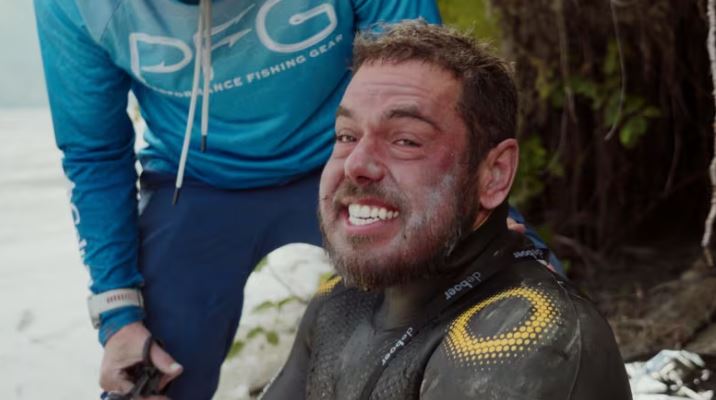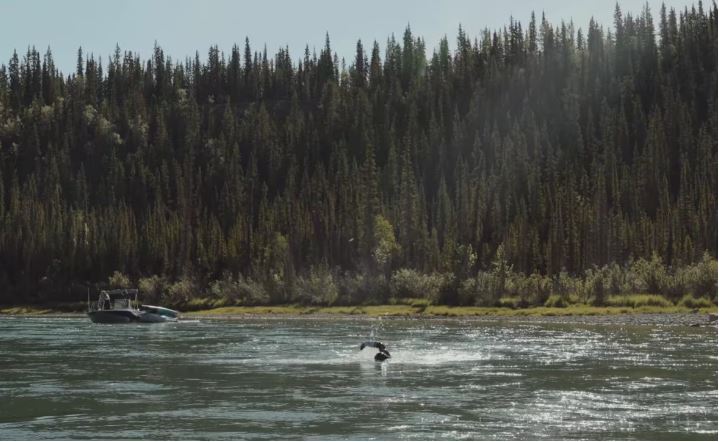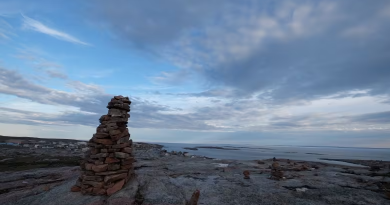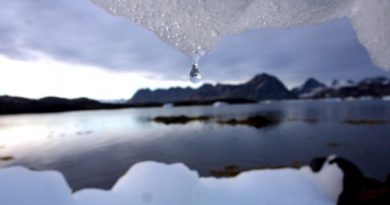U.K. man swims 510-km non-stop down frigid Yukon River

Ross Edgley thinks he must have looked a little bit like a dying salmon, to that curious eagle following overhead as Edgley continued his grueling swim down the Yukon River.
“I was 50 hours in at this point. So it was a very laboured, tired stroke. And we think that the eagle was basically waiting for me to stop flapping around before it might have come and investigated,” Edgley recalled.
Edgley didn’t stop “flapping” for several more hours, though — not until he had completed his epic, 510-kilometre, two-and-a-half day, non-stop swim down a remote stretch of the frigid northern river.
We knew that we were pushing it so close to sort of like, playing with the boundaries of common sense, and sport science really, said the U.K.-based ultra-marathon swimmer, about his feat last week.
“But that was the appeal of this for everybody, that anything beyond those sorts of distances … every stroke takes you into the unknown.”
Edgley, who has done many long-distance swims all over the world, is perhaps best known for becoming the first swimmer to circumnavigate the British mainland, over 155 days in 2018.
He’s spent plenty of time in lakes and oceans, but said he’d recently become “obsessed” with the idea of attempting a long, non-stop river swim. That led him to the Yukon River — a seemingly unlikely choice, with its bone-chilling temperatures, fast and sometimes unpredictable currents, and long stretches through remote wilderness.
It was actually the ideal choice, he said.
It’s really interesting because there’s not many places in the world that you can actually do it. So when you start looking at moving currents, the speed, temperature, wildlife, bacteria, there’s all sorts of dangers — even sort of politics and geography, if you’re going through war zones and various things like that, he said.
“The Yukon represented so many challenges, so many dangers as well, but it was also the perfect swimming pool, if we got it right.”
Wearing a full wetsuit, Edgley started off from the north end of Lake Laberge, where the Yukon River drains. He’d spend the next 60 or so hours making his way down river, never sleeping or getting out of the water, taking some nourishment every 20 minutes or so, and fighting hypothermia the whole time.

He had a full support team travelling with him in boats, including his partner and his brother, a doctor, and some of the local organizers of the Yukon River Quest, an annual long-distance paddling race down the river. One of those Yukoners was Liam Parfitt.
It sounded like something that I’d be interested in because it’s a little bit manic, Parfitt recalled, about hearing of Edgley’s plan.
“I also thought these people probably don’t have the best idea of what they’re getting into, so they do need someone with some experience on the river.”
The first night wasn’t so bad, Parfitt recalled, but by the next morning Edgley was getting cold.
“And then as we progressed, it just got more and more and more difficult — which, that was kind of why I wanted to do it, was to watch how someone could stay in the water,” Parfitt said.

By the second day, Edgley said he was starting to hallucinate. He relied heavily on his support team to help him navigate down the ever-changing river, which he calls a “minefield within a maze.”
So often I say with swims like this, you have to outsource common sense — because you can’t trust your own thoughts, he said.
Still, he remembers times when he could pause and simply be awestruck by the beauty around him. Even as hypothermia was setting in, he relished the experience.
“I was really shivering from my core. All of a sudden, the Yukon just decided to just gift us this amazing sunrise. It came over the mountains, and just feeling the sun on your skin, it’s indescribable.”

Towards the end of his swim, the Yukon offered up another, less-welcome surprise: a nearby wildfire that made for smoky conditions and breathing trouble for Edgley.
It was a really tough finish and something we hadn’t accounted for. We thought, over 60 hours, we’ve seen it all. And then right at the very end, fire
Parfitt recalls how emotions were running high — no doubt fuelled by sleeplessness — and some of the crew thought Edgley should call it quits. The river was murky in that stretch and the support boats had to stick as close as possible to the swimmer who could have disappeared at any moment.
It’s very difficult to imagine, but he doesn’t have a life jacket. And so if he was to go unconscious, which could easily happen after that many hours of no sleep, where does he go? And how do you get him out? Parfitt recalled.
Edgley pressed on though, and finally crawled out of the water where the Stewart River meets the Yukon. After so long in the water, he had trouble using his legs.
“It wasn’t the heroic end that I sort of envisioned in my head, but it didn’t matter,” Edgley said. “It was an end, you know, and it was a successful end.”
The challenges weren’t over, though. Parfitt said that’s the point when the support team was actually most concerned for Edgley’s safety.
The biggest risk for death is as you come out of the water, Parfitt said. Because you’ve been fighting hypothermia for so long. So the blood pressure drops a lot as he came out of the water… There’s a lot of concern for his health at that point.
They immediately wrapped Edgley in sleeping bags, life jackets, sweaters — “anything that was in my boat,” Parfitt said — and raced him downriver to Dawson City where medical help was waiting to monitor him overnight and ensure he was OK.
A week later now, Edgley is feeling fine and excited to talk about his adventure. He said river swimming was “completely unique,” and travelling the storied Yukon River offered an amazing history lesson.
I’ve never been to Canada, this was my first time. So to do it and to learn about it this way was amazing, he said.
“I recommend it to everybody.”
Related stories from around the North :
Finland: Younger Finns more and more attracted to winter swimming, Yle News
Iceland: How Canadian scientists discovered a geothermal source in 1970s rural Iceland, CBC News
United Stated: Algae-related toxins found in Arctic sea mammals, Alaska Dispatch News



